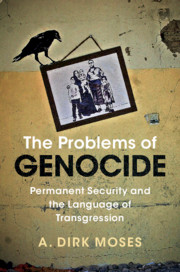Introduction
The Problems of Genocide
Published online by Cambridge University Press: 07 January 2021
Summary
Genocide is a problem in two ways: not only the terrible fact of mass death, but also how the relatively new idea and law of genocide organizes and distorts our thinking about civilian (that is, noncombatant) destruction. Taking the normative perspective of civilian immunity from military attack that international law and norms ostensibly prioritize, this book argues that their implicit hierarchy, atop which sits genocide as the “crime of crimes,” blinds us to other types of humanly caused civilian death, like bombing cities and the “collateral damage” of missile and drone strikes, blockades, and sanctions. In other words, talk of genocide functions ideologically to detract attention from systematic violence against civilians perpetrated by governments, including Western ones. The Problems of Genocide also contends that this violence is the consequence of “permanent security” imperatives: the striving of states, and armed groups seeking to found states, to make themselves invulnerable to threats. Permanent security is the unobtainable goal of absolute safety that necessarily results in civilian casualties by its paranoid tendency to indiscriminate violence. To solve the problem of genocide concealing permanent security, this book proposes replacing the former with the latter: permanent security should be illegal.
- Type
- Chapter
- Information
- The Problems of GenocidePermanent Security and the Language of Transgression, pp. 1 - 46Publisher: Cambridge University PressPrint publication year: 2021

